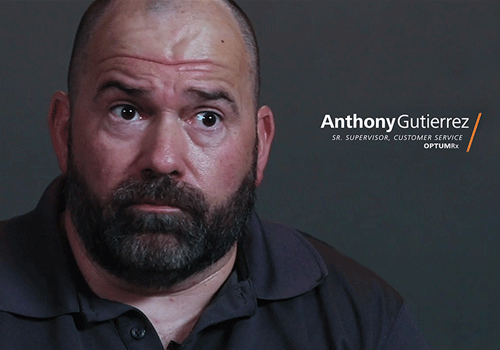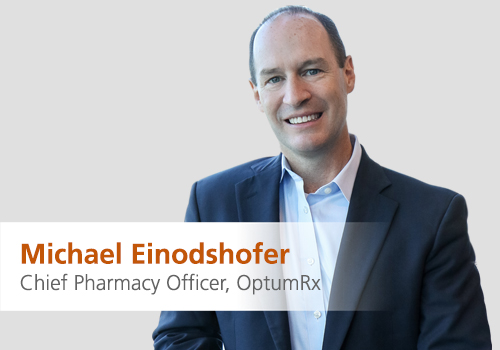Background
5 Questions with Linda Nichols: How Optum Rx pharmacists promote quality health care
38 million working Americans are at-risk for complications due to overprescribed medications, including adverse drug events, increased hospital readmissions, and increased mortality.
We wrote about this last fall when introducing the new Optum Rx® Polypharmacy Value Management Program.
We recently sat down with Linda Nichols, Pharm.D., who is a director of clinical services at Optum Rx. We wanted to learn more about how the polypharmacy program leverages the extensive Optum Rx case management infrastructure to engage members taking five or more chronic medications.
1. Can we begin with a general overview of some of the ways Optum Rx pharmacists consult with individual members?
Happy to. Optum Rx pharmacists are highly skilled clinicians who interact with members and providers every day. They are key practitioners in our condition-management programs, engaging members to help ensure medication use remains safe and effective.
Medication review consultations between Optum Rx pharmacists and members validate that their medications are still providing benefit. Members can better understand how best to use their medications. This helps them avoid adverse events and validate that their treatment is still providing benefit. For example, many medications require routine monitoring as recommended in clinical practice guidelines. During the medication review process, pharmacists will ask members if they are getting the necessary testing recommended for a medication and can even help interpret those test results. Members learn that certain results need ongoing follow-up with their provider. More generally, they learn what information they should share with their provider about their response to their medications.
The pharmacist, member and provider work together to determine what, if any, changes are necessary to the medications a member is taking. We have found that a shared-decision process is very successful in giving members a voice in their care.
The pharmacist, member and provider work together to determine what, if any, changes are necessary to the medications a member is taking. We have found that a shared-decision process is very successful in giving members a voice in their care.
2. You mentioned the polypharmacy initiative. Can you talk more about the systematic, data-driven approach used to address medication overload?
We are very excited about the Polypharmacy Value Management program as it has been successful in deprescribing medications that are causing harm or are no longer providing benefit. Polypharmacy is one person’s use of multiple medications at one time (typically five or more). Research shows that for every additional medication a person uses, their risk for experiencing an adverse event increases up to 10%.
We use sophisticated analytics to identify members with potential medication overload. Our systems look for certain medications, or combinations of medications, that are known to increase adverse events.
Polypharmacy can also indicate wasteful treatment. Even if a medication isn’t causing harm, it may no longer be providing any benefit. And we have learned from our members that many would like to use fewer medications if their provider agrees.
Based on our analysis, members receive a letter or call inviting them to a prescription checkup. Pharmacists invite members to a virtual one to one conversation. Together, they review each medication through the lens of how each member perceives its’ benefit. By carefully listening to members, our pharmacists can assess the member’s response to medications and identify the ones that are likely to present the opportunity to lower that member’s medication burden.
With the member’s agreement, our pharmacists reach out to their provider to have some medications evaluated for their continued use. The provider then evaluates the drug and takes action, if clinically warranted.
This program resonates with members since they are often unsure about what information they should share with their providers about their response to a medication.
We are often asked if routine safety programs are enough to stop harmful and unnecessary treatment. The answer is no. These programs are necessary and do a great job of surveilling for medication-related problems. But the polypharmacy program has uncovered significant safety concerns that can only be identified when a member talks directly with one our pharmacists. For example, we have identified cases of sleep walking due to the use of a popular sleeping pill. Many are unaware of this potentially dangerous adverse effect.
3. What kind of training and expertise do Optum Rx pharmacists have?
Optum Rx consultant pharmacists are thoroughly grounded in the latest treatment guidelines and best practices for medication management.
In addition to our polypharmacy staff, Optum Rx has pharmacists who are certified in pharmacogenomics, who are certified diabetes educators, who specialize in geriatrics, and who are knowledgeable about orphan drugs which are used to treat rare diseases.
Of course, these clinical skills are backed up with deep interpersonal training. Our pharmacists have honed their consultation skills to make members feel comfortable- like they are talking with a trusted partner. The reason they feel that way is because they are.
Our pharmacists truly enjoy helping the healthcare system work better for everyone. The compassion and dedication our pharmacists have for our members has helped our members live healthier lives.
From the pharmacist’s perspective, there is nothing more gratifying than knowing that you helped a member take the right steps toward improving their care. Our entire pharmacy team gets great satisfaction from developing and delivering novel programs that bring members, providers and pharmacists together.
4. As we’ve talked, it’s become clear that these member-focused programs need everyone to participate in the process and that this directly benefits members. Can you talk about how?
This novel program is so important because it has helped members feel comfortable talking about their medication experience. The members our pharmacists consulted with are grateful. They say they like learning what questions they should ask every time they get a new prescription and knowing what to look for to avoid adverse events or ensure a medication is working properly. They also like the fact that their providers are now aware and able to discontinue the medication or switch them to a safer alternative.
Members who participate in the Polypharmacy Value Management program say they genuinely appreciate the education and provider outreach our pharmacists provide. We have seen situations where members received important information about a medication, and then followed up directly with their provider to see if the medication could be stopped or changed. The pharmacist consultations empower members by helping them know what about their medication experience is important to share with their providers. We have seen similar actions across other consultation-based programs too.
Conversation is powerful: we help our members recognize that they have a voice in their care.
5. How about physicians? How have they reacted to our involvement?
Providers like the Polypharmacy Value Management program too. Our member and provider shared decision model incorporates a member’s values and preferences alongside current clinical standards of practice to bring about the best healthcare decisions for our members.
We have seen positive provider engagement across all our consultation-based programs, and most recently in the Polypharmacy program. Providers appreciate when we share information about their patient’s response to a medication, and they are taking deprescribing actions 40% of the time following pharmacist outreach. We see this through changes to prescription claims. This demonstrates that providers are receiving our recommendations and taking action by evaluating and changing medications when needed, helping members get the right kinds and numbers of medication for their care.
To summarize, members, pharmacists and providers must come together to provide the best possible pharmacy care services. Our programs feature a novel approach that leverages the high clinical caliber of Optum Rx pharmacists.
Related content

The dangers of polypharmacy

Optum Rx Customer Obsession Video

5 questions: Optum Rx chief pharmacy officer
STATEMENT REGARDING FINANCIAL INFLUENCE:
This article is directed solely to its intended audience about important developments affecting the pharmacy benefits business. It is not intended to promote the use of any drug mentioned in the article and neither the author nor Optum Rx has accepted any form of compensation for the preparation or distribution of this article.
